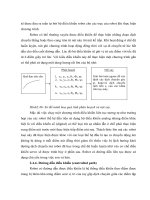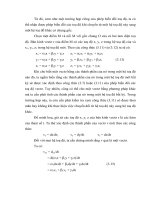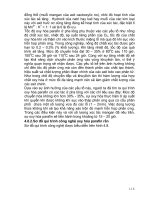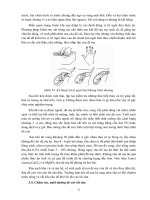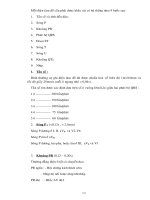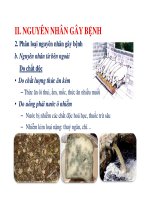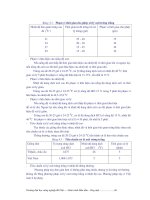Giáo trình TOIEC part 6 pps
Bạn đang xem bản rút gọn của tài liệu. Xem và tải ngay bản đầy đủ của tài liệu tại đây (299.38 KB, 12 trang )
badly
I feel much better today than I did last week.
The university is farther than the mall.
He has less time now than he had before.
Marjorie has more books than Sue.
This magazine is better than that one.
He acts worse now than ever before.
+ further = more.
Ví dụ:
The distance from your house to school is farther than that of mine.
He will come to the US for further education next year.
22.5
So sánh đa bộ
Là loại so sánh gấp r
ỡi, gấp đôi, gấp 3. Nên nhớ rằng trong cấu trúc này không đ
ợc dùng so sánh hơn kém
mà phải dùng so sánh bằng.
Subject + verb + bội số + as +
much
+ noun + as +
many
noun
pronoun
Ví dụ:
This encyclopedia costs twice as much as the other one.
At the clambake last week, Fred ate three times as many oysters as Barney.
Jerome has half as many records now as I had last year.
L
u ý:
- Khi dùng so sánh loại này phải xác định rõ danh từ đó là đếm đ
ợc hay không đếm đ
ợc vì đằng tr
ớc chúng
có much và many.
- Các cấu trúc twice that much
many
(gấp đôi số đó)
chỉ đ
ợc dùng trong văn nói, tuyệt đối không đ
ợc dùng trong văn viết.
Ví dụ:
We had expected eighty people at the rally, but twice that many showed up. (văn nói)
We had expected eighty people at the rally, but twice as many as that number showed up. (văn viết)
22.6
So sánh kép (càng thì càng)
Những câu này bắt đầu bằng một cấu trúc so sánh hơn, và do đó mệnh đề thứ 2 cũng phải bắt đầu bằng một
cấu trúc so sánh hơn.
The + comparative + subject + verb + the comparative + subject + verb
Ví dụ:
The hotter
it is,
the more miserable
I feel.
The hotter
it is,
the more miserable
I feel.
The higher we flew, the worse Edna felt.
The bigger they are, the harder they fall.
The sooner you take your medicine, the better you will feel.
The sooner you leave, the earlier you will arrive at your destination.
The more + subject +verb + the + comparative + subject + verb
The more you study, the smarter you will become.
The more he rowed the boat, the farther away he got.
The more he slept, the more irritable he became.
22.7
No sooner than (vừa mới thì; chẳng bao lâu thì)
Nếu thành ngữ no sooner xuất hiện ở đầu câu thì than phải đầu cho mệnh đề 2. L
u ý rằng trợ động từ phải
đứng tr
ớc chủ ngữ theo công thức sau:
No sooner + auxiliary + subject + verb + than + subject + verb
Ví dụ:
No sooner had they started out for California than it started to rain.
No sooner will he arrived than he will want to leave.
No sooner had she entered the building than she felt the presence of somebody else.
L
u ý:
No longer nghĩa là not any more (không còn nữa). Không bao giờ đ
ợc sử dụng not longer trong câu mà
nghĩa của nó nh
vậy.
John no longer studies at the university.
(John doesnt study at the university any more).
Cynthia may no longer use the library because her card has expired.
(Cynthia may not use the library any more)
23.
Dạng nguyên, so sánh hơn và so sánh hơn nhất.
Phần lớn các tính từ diễn tả (trạng thái, tính cách, vẻ đẹp ) đều có 3 dạng: dạng nguyên (happy), dạng so
sánh hơn (happier) và so sánh hơn nhất (happiest).
Dạng nguyên so sánh so sánh nhất
hot
interesting
sick
colorful
hotter
more interesting
sicker
more colorful
hottest
most interesting
sickest
most colorful
- Dạng nguyên không chỉ sự so sánh. Nó chỉ mô tả phẩm chất đơn thuần của 1 ng
ời, 1 vật, hay một nhóm
(ng
ời hoặc vật).
Ví dụ:
The house is big.
The flowers are fragrant.
- Dạng so sánh hơn chỉ ra mức độ mạnh hơn hay yếu hơn về sự khác nhau giữa 2 ng
ời (2 vật).
Ví dụ:
My dog is smarter than yours.
Bob is more atheletic than Richard.
Spinach is less appealing than carrots.
* Ta cũng có thể so sánh 2 thực thể (ng
ời hoặc vật) mà không sử dụng than. Trong tr
ờng hợp này thành ngữ
of the two sẽ đ
ợc sử dụng trong câu (nó có thể đứng đầu câu và sau danh từ phải có dấu phẩy, hoặc đứng ở
cuối - Xem 2 công thức d
ới đây).
Subject + verb + the + comparative + of the two + (noun)
hoặc
of the two + (noun), + Subject + verb + the + comparative
Harvey is the smarter of the two boys.
Of the two shirts, this one is the prettier.
Please give me the smaller of the two pieces of cake.
Of the two landscapes that you have shown me, this one is the more picturesque.
Of the two books, this one is the more interesting.
Ghi nhớ:
2 thực thể - so sánh hơn
3 thực thể trở lên - so sánh hơn nhất
- ở cấp độ so sánh hơn nhất, 3 thực thể trở lên đ
ợc so sánh với nhau, một trong chúng trội hơn hoặc kém
hơn so với các thực thể còn lại.
adj+ est
Subject + verb + the + most + adj +
least + adj
John is the tallest boy in the family.
Deana is the shortest of the three sisters.
These shoes are the least expensive of all.
Of the three shirts, this one is the prettiest.
L
u ý:
- Sau thành ngữ one of the + superlative, danh từ phải để ở dạng số nhiều và động từ chia ở ngôi số ít.
Ví dụ:
One of the greatest tennis players in the world is Bjon Borg.
Kuwait is one of the biggest oil producers in the world.
Các phó từ không đ
ợc đi kèm bởi -er hoặc -est. Mà thay vì đó, khi đ
ợc dùng trong câu so sánh chúng đi
cùng more hoặc less đối với cấp so sánh hơn, và với most hoặc least để thành lập nên dạng so sánh hơn nhất.
Dạng nguyên So sánh hơn So sánh hơn nhất
carefully
more carefully
less carefully
most carefully
least carefully
In + dtđ
2
số ít
of + dtđ
2
số nhiều
cautiously
less carefully
more cautiously
less cautiously
least carefully
most cautiously
least cautiously
Ví dụ:
Sal drove more cautiously than Bob.
Joe dances more gracefully than his partner.
That child behaves the most carelessly of all.
Irene plays the most recklessly of all.
24.
Các danh từ làm chức năng tính từ
Trong tiếng Anh, rất nhiều danh từ có thể làm chức năng tính từ khi chúng đứng tr
ớc các danh từ khác (a
wool coat, a gold watch, a history teacher). Danh từ đứng đầu của sự kết hợp đóng vai trò một tính từ, mô tả
danh từ thứ 2 (đóng vai trò danh từ). Tất cả các danh từ với chức năng tính từ luôn ở dạng số ít cho dù danh
từ mà nó bổ nghĩa có ở số nhiều. Sự kết hợp số - danh từ luôn phải có dấu gạch ngang -.
Ví dụ:
We took a tour that lasted five weeks.
(Weeks làm chức năng danh từ trong câu này).
We took a five-week tour.
Adj noun
His subscription to that magazine is for two years.
(years : danh từ)
He has a two-year subscription to that magazine.
Adj noun
That student wrote a report that was ten pages long.
(pages : danh từ)
That student wrote a ten-page report.
Adj noun
These shoes cost twenty dollars.
These are twenty-dollar shoes.
Adj noun
25.
Enough với tính từ, phó từ và danh từ
Sự thay đổi vị trí của enough tuỳ thuộc vào việc nó bổ nghĩa cho 1 danh từ, 1 tính từ, hay 1 phó từ. Khi bổ
nghĩa cho 1 tính từ hay 1 phó từ, enough đứng đằng sau:
adj
+ enough
adv
Are those French fries crisp enough for you?
Adj
She speaks Spanish well enough to be an interpreter.
Adv
It is not cold enough to wear a heavy jacket.
Adj
Khi bổ nghĩa cho một danh từ enough đứng đằng tr
ớc.
enough + noun
Do you have enough sugar for the cake?
noun
Jake bought enough red paint to finish the barn.
noun
He does not have enough money to attend the concert.
noun
L
u ý:
Danh từ mà
enough
bổ nghĩa đôi khi không cần thiết có mặt trong câu mà không làm thay đổi nghĩa của
câu.
I forgot my money. Do you have enough?
(ta hiểu rằng ngụ ý của ng
ời nói là enough money)
26.
Các từ nối chỉ nguyên nhân
Phần này sẽ trình bày cách sử dụng một vài công cụ ngữ pháp chỉ nguyên nhân.
26.1
Because/ because of
Because ( không có of) đòi hỏi đằng sau nó là một câu hoàn chỉnh (phải có chủ ngữ và động từ). Because of
đòi hỏi đằng sau nó là một danh từ hoặc 1 ngữ danh từ ( không đ
ợc phép có động từ liên hợp).
Subject + verb
because +
there + verb + subject
because of + danh từ ( hoặc cụm danh từ)
L
u ý:
Because of có thể thay thế cho thành ngữ due to.
Jan was worried because it had started to rain.
Subject verb
Jan was worried because of the rain.
noun
The students arrived late because there was a traffic jam.
verb subject
The students arrived late because of the traffic jam.
noun phrase
We have to cut down on our driving because there is an oil shortage.
verb subject
We have to cut down on our driving because of the oil shortage.
noun phrase
26.2
Mục đích và kết quả (so that- để)
Các mệnh đề chỉ mục đích đ
ợc đi cùng với liên từ so that. Sau so that là một mệnh đề kết quả gồm chủ ngữ
và động từ. Thời gian của mệnh đề kết quả phải ở t
ơng lai trong mối quan hệ với thời gian của mệnh đề chỉ
mục đích.
adjective
adverb
Subject + verb + so that + subject + verb
L
u ý:
Mặc dù trong văn nói có thể chấp nhận không có that nh
ng trong văn viết buộc phải có that.
He studied very hard so that he could pass the test.
(nó đã học rất chăm chỉ để có thể qua đ
ợc kỳ thi)
She is sending the package early so that it will arrive in time for her sisters birthday.
Damien is practicing the guitar so that he can play for the dance.
I am learning German so that I will be able to speak it when I go to Austria next summer.
Susan drove to Miami instead of flying so that she could save money.
Will you let me know about the party so that I can make plans to attend?
26.3
Cause and effect
Những cấu trúc sau đây đ
ợc sử dụng để chỉ mối quan hệ nhân quả.
Subject + verb + so
+ + that +
subject + verb
L
u ý
: Không sử dụng một danh từ sau so. Còn muốn dùng danh từ thì xem các cấu trúc d
ới đây.
The soprano sang so well that she received a standing ovation.
Terry ran so fast that he broke the previous speed record.
Judy worked so diligently that she received an increase in salary.
The soup tastes so good that every one will ask for more.
The little boy looks so unhappy that we all feel sorry for him.
The students had behaved so badly that he was dismissed from the class.
Các cấu trúc chứa các bổ ngữ c
ờng độ:
Subject + verb + so + + dt đ
2
số nhiều + that + subject + verb
The Smiths had so many children that they formed their own baseball team.
I had so few job offers that it wasnt difficult to select one.
Subject + verb + so + + dt không đ
2
+ that + subject + verb
He has invested so much money in the project that he cannot abandon it now.
The grass received so little water that it turned brown in the heat.
Subject + verb + such + a + adjective + dt đ
2
số ít + that
hoặc
Subject + verb + so + adjective + a + dt đ
2
số ít + that
L
u ý
:
Such + a + adjective th
ờng đ
ợc dùng nhiều hơn trong 2 cấu trúc trên.
It was such a hot day that we decided to stay indoors.
Hoặc
It was so hot a day that we decided to stay indoors.
It was such an interesting book that he couldnt put it down.
Hoặc
It was so interesting a book that he couldnt put it down.
Subject + verb + such + adjective + + that + subject + verb
She has such exceptional abilities that everyone is jealous of her.
dt đếm đ
ợc số nhiều
They are such beautiful pictures that everybody will want one.
dt đếm đ
ợc số nhiều
Perry has had such bad luck that hes decided not to gamble.
dt không đếm đ
ợc
This is such difficult homework that I will never finish it.
dt không đếm đ
ợc
L
u ý
: Ta không thể sử dụng so trong cấu trúc trên.
Phân tích nghĩa của các cấu trúc trên.
ví dụ:
It has been such a long time since Ive seen him that Im not sure if I will remember him
( Tôi không biết liệu tôi có nhận đ
ợc ra nó không vì đã lâu lắm rồi tôi không gặp nó.)
Nguyên nhân: It has been a long time.
Kết quả : Im not sure if I will remember him.
He has so heavy a work load that it is difficult for him to travel.
( Thật là khó đối với anh ta trong chuyện đi du lịch bởi vì anh ta có nhiều công việc phải làm.)
Nguyên nhân: He has a very heavy work load.
Kết quả : It is difficult for him to travel.
Peter has
such long fingers
that
he should play the piano.
Peter has
such long fingers
that
he should play the piano.
(Peter nên chơi đàn Piano bởi vì nó có những ngón tay dài.)
Nguyên nhân: Peter has such long fingers.
Kết quả : He should play the piano.
Professor Sands gives such interesting lectures that his classes are never boring.
(các giờ học của giáo s
Sands chẳng bao giờ buồn tẻ bởi vì ông ấy th
ờng đ
a ra những bài giảng hết sức thú
vị.)
Nguyên nhân: Professor Sands gives very interesting lectures.
Kết quả : His classes are never boring.
This is such tasty ice cream that Ill have another helping.
(Tôi sẽ gọi một suất kem nữa vì nó rất ngon.)
Nguyên nhân: The ice cream is very tasty.
Kết quả : Ill have another helping.
27.
Một số từ nối mang tính điều kiện
even if + nagative verb
(cho dù )
You must go tomorrow even if you arent ready.
Whether or not + positive verb
(dù có hay không)
He likes watching TV whether or not the show is god.
unless + positive verb = if not
(trừ phi, nếu không)
If you dont start at once, you will be late.
= You will be late unless you start at once.
But for that + unreal condition
(nếu không thì )
Her father pays her fees, but for that she wouldnt be here ( but she is here)
present điều kiện không thực ở hiện tại
My car broke down, but for that I could have come in time.
quá khứ điều kiện không thực ở quá khứ
otherwise + conditional sentence kẻo, nếu không thì
- Điều kiện có thể thực hiện đ
ợc.
We must be back before midnight, otherwise I will be locked out.
- Điều kiện không thực hiện đ
ợc.
Her father pays her fees, otherwise she couldnt be here.
present
điều kiện không
thực ở hiện tại
Simple present
will + verb
Simple past
past perfect
present
điều kiện không
thực ở hiện tại
I used a computer, otherwise it would have taken longer.
quá khứ điều kiện không thực ở quá khứ
Nhận xét.
Trong tiếng Anh hàng ngày, ng
ời ta dùng or else để thay thế cho otherwise.
Provided/providing (that)
(với điều kiện là, miễn là )
You can camp here provided (that) you leave no mess.
Suppose/ supposing ? = what if ?
(giả sử vì sao, nếu vì sao)
Suppose the plane is late? = what will happen if the plane is late?
- Từ nối này còn đ
ợc sử dụng để đem ra lời gợi ý.
Suppose you ask him = why dont you ask him?
What if Im- tao thế thì sao nào
đ
a ra sự thách thức
If only
+ =
hope that
Hy vọng là
If only he comes in time (hy vọng anh ấy đến đúng giờ)
If only he will head your advice.
If only +
= wish that
Giá mà - trái với thực tế.
If only he didnt smoke. (but he doesnt)
If only she had come in time. (but she didnt)
if only + would verb -
ớc sao, mong sao
- dùng để diễn đạt một
ớc muốn ở hiện tại
If only he would drive more slowly (but he drive so fast)
hoặc một
ớc muốn vô vọng ở t
ơng lai.
If only it would stop raining.
Mong sao trời đừng m
a nữa - nh
ng thực tế thì trời đang m
a rất to.
28.
Câu bị động
Câu bị động đ
ợc sử dụng nhằm để nhấn mạnh vào hành động của tân ngữ chứ không nhấn mạnh vào hành
động của chủ ngữ trong câu chủ động.
be + P
2
Ph
ơng pháp chuyển đổi từ câu chủ động sang câu bị động.
- Đ
a tân ngữ của câu chủ động lên làm chủ ngữ. Trong tr
ờng hợp nếu có 2 tân ngữ ( 1 trực tiếp, 1 gián tiếp),
muốn nhấn mạnh vào tân ngữ nào thì ng
ời ta đ
a nó lên làm chủ ngữ ( nh
ng th
òng là tân ngữ gián tiếp làm
chủ ngữ).
Ví dụ:
I gave him a book.
hay I gave a book to him.
Trong câu này book là tân ngữ trực tiếp, him là tân ngữ gián tiếp, ta đổi:
He was given a book by me.
- Thời của động từ ở câu bị động phải tuân theo thời của động từ ở câu chủ động.
- Đặt by + tân ngữ mới đằng sau tất cả các tân ngữ khác.
- to be made, to be made of đ
ợc làm bằng - chỉ một vật đ
ợc làm bằng 1 thứ nguyên vật liệu.
This table is made of wood.
- to be made from: đ
ợc làm bằng - chỉ một vật đ
ợc làm bằng 2 thứ nguyên vật liệu trở lên.
- to be made out of: đ
ợc làm bằng ( dùng cho thực phẩm)
This cake is made out of flour, egg, butter and sugar.
- Mọi biến đổi về thời và thể đều nhằm vào động từ to be, còn phân từ 2 giữ nguyên (xem các công thức d
ới
đây.)
Simple present hay simple past
am
is
are + [verb in past participle]
was
were
Chủ động : Hurricanes destroy a great deal of property each year.
Subject present complement
Bị động : A great deal of property is destroyed by hurricanes each year.
singular subject be past participle
Chủ động : The tornado destroyed thirty houses.
Subject past complement
Bi động : Thirty houses were destroyed by the tornado.
plural subject be past participle
present progressive
hay
Past progressive
am
am
is
are + being + [verb in past participle]
was
were
Chñ ®éng : The committee is considering several new proposals.
Subject present progressive complement
BÞ ®éng : Several new proposals are being considered by the committee.
plural subject auxiliary be past participle
Chñ ®éng : The committee was considering several new proposals.
Subject past progressive complement
BÞ ®éng : Several new proposals were being considered by the committee.
plural subject auxiliary be past participle
present perfect
hay
Past perfect
has
have + been + [verb in past participle]
had
Chñ ®éng: The company has ordered some new equipment.
subject present perfect complement
BÞ ®éng : Some new equipment has been ordered by the company.
Singular subject auxiliary be past participle
Chñ ®éng : The company had ordered some new equipment before the strike began.
subject past perfect complement
BÞ ®éng : Some new equipment had been ordered by the company before the strike began.
Singular subject auxiliary be past participle
§éng tõ khiÕm khuyÕt (modal)
modal + be + [ verb in past participle]
Chñ ®éng : The manager should sign these contracts today.
Subject modal + verb complement
BÞ ®éng : These contracts should be signed by the manager today.
Subject modal be past participle
modal + perfect
modal + have + been + [ verb in past participle]
Chñ ®éng:
Somebody
should have called
the president
this morning.
Chủ động:
Somebody
should have called
the president
this morning.
Subject modal + perfect complement
Bị động : The president should have been called this morning.
Subject modal have be past participle
29.
Động từ gây nguyên nhân
Động từ gây nguyên nhân đ
ợc sử dụng để chỉ ra một ng
ời gây cho ng
ời thứ hai làm một việc gì đó cho ng
ời
thứ nhất. Một ng
ời có thể gây cho ai đó phải làm cái gì đó cho anh ta hoặc cho chị ta qua việc chi trả tiền,
yêu cầu, hoặc c
ỡng ép ng
ời đó. Các động từ gây nguyên nhân là: have, get, make.
29.1
Have/ get / make
Mệnh đề theo sau have hoặc get có thể ở dạng chủ động hoặc bị động.
To have smb do smth = to get smb to do smth
(Sai ai, khiến ai, bảo ai làm gì)
Mary had John wash the car (John washed the car.)
Mary got John to wash the car. (John washed the car.)
To have / get smth done
(đ
a cái gì đi làm )
- Bản thân mình không làm đ
ợc nên nhờ 1 ng
ời khác làm.
Ví dụ:
Mary got the car washed. (The car was wash by somebody.)
Mary had the car washed. (The car was wash by somebody.)
I have the laundry washed. (the laundry is washed by someone)
To want / like something done
Mẫu câu hỏi của 2 động từ này sẽ là:
- What do you want done to Anh muốn làm gì với
Ví dụ:
- What do you want done to your motorbike?
- Id like it repaired and cleaned
hoặc I want it repaired and cleaned.
To make smb do smth = to force smb to do smth
( buộc ai phải làm gì.)
Ví dụ:
The robber forced the teller to give him the money.
= The robber made the teller give him the money.
Động từ to make vả to cause còn đ
ợc dùng theo mẫu sau:
